#it was authoritarianism
Explore tagged Tumblr posts
Text




Combining the three most straightforward posts on this, and my own reminder:
Project 2025 doesn't talk about arresting protestors via cops. It talks about "putting them down" using the military on US citizens. Which means "accidental" deaths from tear gas and rubber bullets won't be the exception, a bullet in the head will be the *plan.* If your kid or grandpa was there too bad; they had terrorist sympathies and were probably under the influence of Satan according to these MAGA Christo-Nationalists.
Both sides are not the same and FDR's corpse would be a better president than Trump.
#pinned post#past pins are under that tag too#also I say this with my whole chest knowing that my family#had some kinda weird grudge against FDR and his wife#several generations long#after some slight at some book publishing party#in NYC in the 1920's#I do not give a flying fuck#I will fistfight my own ancestors over this#and the Scottish ones would probably help me#because if there's one thing that side of my fam hated#it was authoritarianism
66 notes
·
View notes
Text
So many people seem completely unaware of what a genuine apology is.
And that's because children are forced to say sorry on command.
Before they ever had a chance to process what they did, why they did it, what effect it had on others, or what they should have done instead, they're expected to say that they're sorry. And they're expected to "say it like you mean it" with no indication of what that even means and with no time to figure out how to phrase it correctly.
Sometimes, even when the child's actions are justified by any logical reasoning, they're expected to apologize because an authority figure demands it.
The goal of saying sorry ends up being solely to avoid punishment. And they phrase the apology in whatever way the authority figure will accept.
The result is an entire society filled with people who give completely useless apologies that appear like they're only trying to avoid punishment.
19K notes
·
View notes
Text
I really do miss back when it was considered fucking weird to ask trans people(or anyone who is even a little gnc/has a label you don't understand/is giving you queer vibes)* what their assigned sex at birth is. Like we literally used to roast cis people for this shit, that's legit why the "what's in your pants" meme exists, but somehow we've reached a point where a very vocal portion of the online trans community genuinely thinks you owe people this information so they can make insane generalizations about you and your life and if you refuse that's cause for suspicion and I really shouldn't have to explain how fucked that is.
Interrogating people about what's in their pants is transphobe/terf/transmed shit. "If you have nothing to hide you have nothing to fear" is fed shit. Tbh "you owe me personal information about your body and medical history" is ableist and intersexist shit. Sex and/or gender tells you literally nothing concrete about a person and there is no world where you are owed this information. Can we cut this shit out and go back to judging people by their words and actions instead of what some random doctor decided their body looks like when they were a squishy baby, you know, like normal people? Please??
*It's also wildly intersexist but unfortunately I don't think we've ever reached a point of collectively accepting that it's horrid to ask intersex people unprompted questions about their bodies and medical histories. You are absolutely not owed any of that information for any reason, especially given that medical history typically goes hand in hand with profound trauma due to how normalized medical abuse against intersex people is, and everyone needs to get that through their heads yesterday. If they want to share they can and will, aside from that it's none-ya.
#I genuinely do not trust a single person who says you have to reveal extremely personal information about yourself for any reason#it reeks of bigotry and authoritarianism and I'm sick of it#queer commentary#trans commentary#trans discourse#intersexism#transmisogny#transandrophobia#exorsexism
7K notes
·
View notes
Text
Literally begging anyone who can vote in US elections to vote, and to vote against Trump. Which means voting for Harris, not abstaining or voting third party.
My family actually did move here from an authoritarian country, where voting literally didn't matter, they literally did throw out your vote, and they literally did assassinate citizens who spoke out against them.
We would all very much like to keep living in a country where those things are not the case!
You know, the same things that Trump and his stooges have openly said they want to do. And two of the main propaganda lines for why people in the US shouldn't vote, which is a lie.
Voting matters. The parties are not the same.
And make sure to vote in down-ballot races!!!
And like. The fact that voting matters in the US is a very real reason for hope. It is something you should genuinely appreciate. We can make a difference.
And a lot of people risked their lives or even died to earn that right, and it's a right not everyone has.
#interrupting our regularly scheduled programming for a voting matters psa#because I just saw like 5 posts encouraging people not to vote and those posts are bullshit!!!#us politics#election 2024#american politics#2024 election#uspol#voting#voting matters#the parties are not the same#voting rights#democrats#democratic party#united states#not news#yes I also really do wish voting third party had a chance of working#but it doesn't#yes biden's policy on palestine is atrocious and harris's is unlikely to be much better#but that doesn't change the fact that we DON'T live in an authoritarian dictatorship (yet)#and it doesn't change the fact that there is a massive difference between trump and harris#you will have a much harder time helping palestinians if trump wins and starts “crushing” pro-Palestine protests (direct quote from him)#and wrecks the economy so people can't afford to donate or to take the time to protest#me
4K notes
·
View notes
Text
to sum up: eric adams defrauded the city of millions of dollars using fake donations from the authoritarian erdogan government to earn matching money from the municipal electoral public funds program (in fact, matched 8-to-1, e.g., $2,000 for a $250 donation), then enacted austerity, claiming the city had no money, cutting library, education, and homelessness funds, while boosting the NYPD budget, salaries, and overtime pay. cartoon-level villain
3K notes
·
View notes
Text
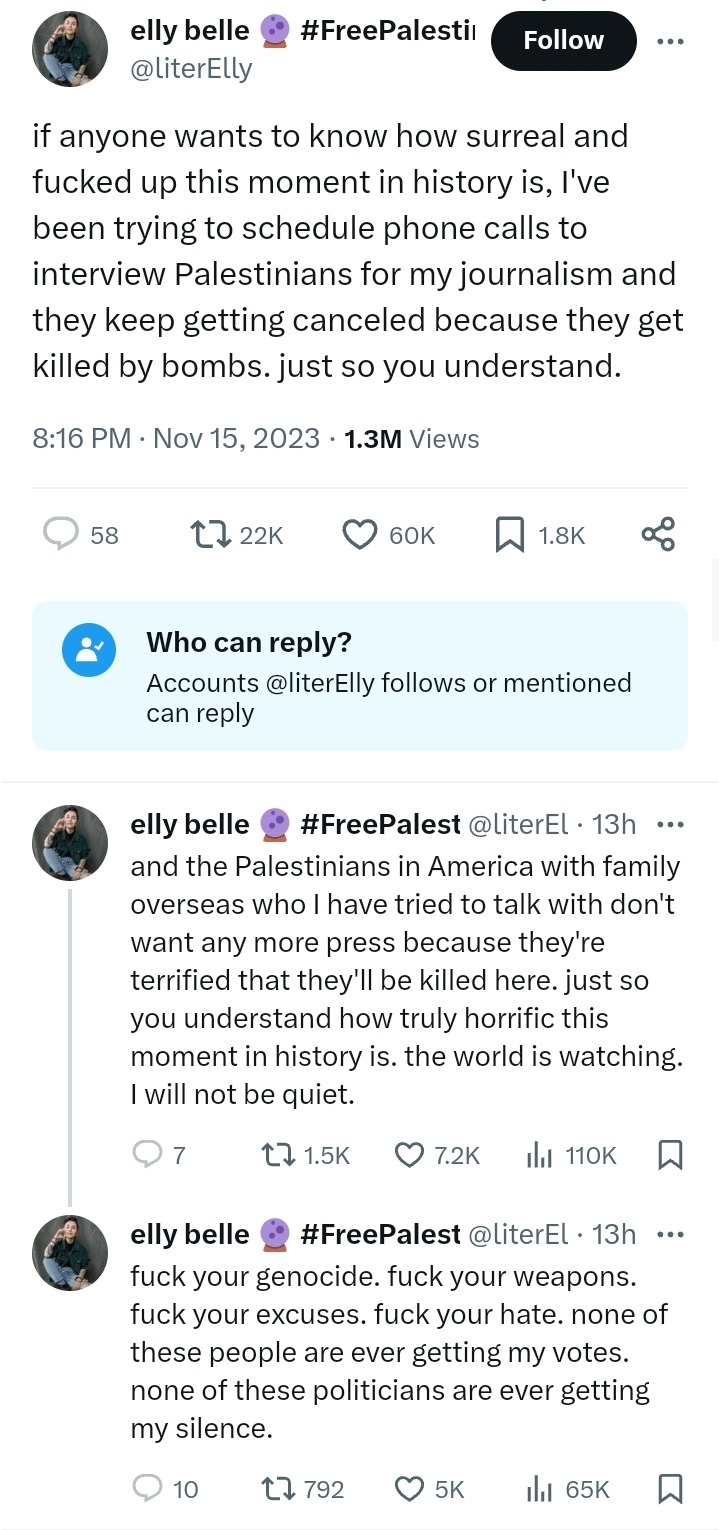
#this is like 9/11 all over again#gaza genocide#tw murder#tw death#ethnic cleansing#palestinian genocide#genocide joe#state terrorism#islamphobia#arab americans#media suppression#freedom of speech#human rights#us politics#white supremacy#journalism#free palestine#fascism#authoritarianism#knee of huss
11K notes
·
View notes
Text
Don't let people tell you that voting doesn't matter
My grandparents came to this country from an authoritarian dictatorship that literally threw out all the votes. And literally falsified the election results. A country where literally no one's vote mattered - and that was during the years you could vote. (You know, all the things people say about the US to try to convince you that your vote doesn't matter.)
It was a country that literally assassinated their political opponents. And literally sent people who spoke out against them to prison for years of hard labor. (You know, the things Trump has openly talked about doing in the US dozens of times.)
My great-grandmother and great-grandfather were both arrested for refusing to join the governing party. They were both imprisoned for years. Their daughter, my grandma, had to live in a boarding house.
My grandpa, her future husband, was imprisoned for two years because of his country of origin.
My great-grandmother forced them to let her out of prison after two years, but only by virtue of being extremely lucky, tough as nails, and willing to potentially die in the process. My great-grandfather was imprisoned at a work camp for seven years, until his legs stopped working from digging holes in the ground in subfreezing water, at which point they threw him in the snow outside the front gates. The only reason he survived was because of the kindness of strangers who drove by.
My great-grandparents lived the rest of their time in that country with surveillance equipment in their home. Hidden microphones and tapped phones, and my great-grandfather's deep-seated fear that his wife's unwillingness to stop talking shit about the ruling party would land them back in prison.
They tried to assassinate my grand-grandfather. They shot at him while he was walking home from the neighbors', and barely missed. They successfully assassinated his cousin, and almost assassinated eight or so other members of his family in the attack.
Voting matters. The right to vote matters. Imperfect elections still matter.
Trump wants to take us to a country like the one my grandparents moved here from. Don't fucking let him.
And don't let anyone persuade you that it's worth the risk to not vote or vote third party.
The country my family is from is now a democracy. Let's keep the US as one too, please.
#voting#voting matters#please vote#us elections#fucking vote#election 2024#vote 2024#kamala harris#harris 2024#harris walz 2024#harris for president#harris walz#kamala 2024#united states#us politics#elections#2024 elections#american elections#politics#american politics#voting rights#dictatorship#democracy#authoritarianism
2K notes
·
View notes
Text
Thinkpieces about why people seem to become more authoritarian as they get older tend to focus on neuroscience and survivorship bias and such, but based on my experience in various activist communities, I think a big piece of the puzzle that these sorts of discussions often overlook is that a large chunk of people just never had any principled objection to authoritarianism in the first place.
It's easy to talk about fighting the power when you're under the boot, but when some folks get hold of any sort of power or authority for themselves and sticking it to the Man is no longer a proposition with no perceived downsides, they start backpedalling in a real hurry. Power didn't corrupt them. Nothing changed about their politics. Their commitment to anti-authoritarianism was only ever as strong as their perception that it personally benefited them.
(You absolutely can't tell who they are just from looking at them, either; a person can use all the right jargon and support all the right causes and show up at all the right protests, yet the moment their private emotional calculus determines, rightly or wrongly, that they have more to gain by putting a boot on your neck than by lifting it off, watch out!)
4K notes
·
View notes
Note
tbh in regards to insulin production id rather trust the beings who are genetically coded to like caring for each other than an impersonal system of violence but thats just me though.
fascinating -- & are these beings 'genetically coded' to know how much insulin is needed and where on a daily basis and where it's most efficient to manufacture it and how many workers are necessary to do that manufacturing and how many people need to be training in that manufacturing each year to keep that number consistent with natural turnover and how much should be stockpiled in case of emergency and what standards of quality and safety it should be held to and how to test those standards and how to secure all the supply chains and logistics necessary for manufacturer to happen in the first place &c. &c &c...
1K notes
·
View notes
Text
"But the art is gross!"
Come'ere and let me tell you a story.
When I was in my senior year, a painting of mine got into an art show at a university museum. I was wild crazy excited and wrote out my artists statement in one night about the piece. I painted it based off a photo I took of a local reservoir during a particularly bad time and my statement spoke about being queer in my city and finding peace at places like the reservoir. I painted it with pallet knives and acrylics.
I was forced to remove any mention of my queerness from my statement due to the "sexual nature" of it by people at my school. There was nothing sexual about it.
Obviously, I did it, with some pressure from others. but when I drove up to see it there, I could not feel proud of it there. Compliments felt hollow. I was told they placed it at the front because they loved it. But it was censored in a way that made it lesser to me. Often I wish I would have refused.
Censorship doesn't stop at "icky" things. It crawls and devours like ivy until everything is dead. Nothing remains.


1K notes
·
View notes
Text
I'll leave you with this thought for the night, gallows-humor though it is: even the lowest-informed, misguided, confused, and sometimes let-us-say-it flatly moronic people in America like to vote and take it for granted that they can meaningfully do so on a regular and expected basis. So if the evil orange and company actually try to make good on this whole no more democracy and/or actual elections thing, I really don't see it working out well for them.
#the national nightmare#the one thing america has going for it is that it is a democracy and always has been#people know the rules and expect to follow them#weak authoritarian or quasi authoritarian or developing countries experimenting with democracy#do not necessarily or at all have this experience and therefore don't have this civilian expectation either#america does#that will help it#anyway i need to sleep and try to figure out how to deal with this shit like the rest of you#i love you and take care of yourselves
772 notes
·
View notes
Text
"How am I supposed to tell the difference between a child challenging my authority and a child asking for clarification because they have a disability?"
You're not. If you expect anyone to submit to your authority, you're inherently ableist. The system was designed to exclude disabled people and you're upholding the system.
You're always justifying your authority by saying that it's your job to teach them right from wrong. If you actually believe that and it's not just a bullshit excuse to justify your abuse, then you should be encouraging them to ask for clarification and reasons.
2K notes
·
View notes
Text

I saw this posted on reddit to a wholesome memes sub, and it was full of nothing but people being unnecessarily awful on a post trying to spread information about why these creatures are beautiful and worthy of living. (Interesting note: They don't need a reason to be allowed to live.) I got sick of trying to correct people on there who were more interested in hating wasps than hearing the truth.
Honestly, it's just exhausting sometimes.
Source: @shencomix - Thanks for helping to spread the word, buddy.
NO ANTI-WASP SENTIMENTS ON THIS POST
#bugblr#wasps#wasp propaganda#i saw someone calling them 'fascist authoritarian bees' and I was just ??????????
14K notes
·
View notes
Text
The entire list was inspired by the great writer and historian, Tim Snyder. His book ‘On Tyranny’ was the essential guide to the first Trump term. ‘Do not obey in advance’ his number one lesson from his work studying authoritarian regimes. In a great stroke of luck, he rang me while I was writing it and, after thinking for a moment, told me that he would enlarge that, now, to ‘Know who you are.’ Know what your values are, what you believe in. I’ve been thinking about that ever since.

433 notes
·
View notes
Text
Indian Prime Minister Narendra Modi is, by some measures, the most popular leader in the world. Prior to the 2024 election, his Bharatiya Janata Party (BJP) held an outright majority in the Lok Sabha (India’s Parliament) — one that was widely projected to grow after the vote count. The party regularly boasted that it would win 400 Lok Sabha seats, easily enough to amend India’s constitution along the party's preferred Hindu nationalist lines.
But when the results were announced on Tuesday, the BJP held just 240 seats. They not only underperformed expectations, they actually lost their parliamentary majority. While Modi will remain prime minister, he will do so at the helm of a coalition government — meaning that he will depend on other parties to stay in office, making it harder to continue his ongoing assault on Indian democracy.
So what happened? Why did Indian voters deal a devastating blow to a prime minister who, by all measures, they mostly seem to like?
India is a massive country — the most populous in the world — and one of the most diverse, making its internal politics exceedingly complicated. A definitive assessment of the election would require granular data on voter breakdown across caste, class, linguistic, religious, age, and gender divides. At present, those numbers don’t exist in sufficient detail.
But after looking at the information that is available and speaking with several leading experts on Indian politics, there are at least three conclusions that I’m comfortable drawing.
First, voters punished Modi for putting his Hindu nationalist agenda ahead of fixing India’s unequal economy. Second, Indian voters had some real concerns about the decline of liberal democracy under BJP rule. Third, the opposition parties waged a smart campaign that took advantage of Modi’s vulnerabilities on the economy and democracy.
Understanding these factors isn’t just important for Indians. The country’s election has some universal lessons for how to beat a would-be authoritarian — ones that Americans especially might want to heed heading into its election in November.
-via Vox, June 7, 2024. Article continues below.
A new (and unequal) economy
Modi’s biggest and most surprising losses came in India’s two most populous states: Uttar Pradesh in the north and Maharashtra in the west. Both states had previously been BJP strongholds — places where the party’s core tactic of pitting the Hindu majority against the Muslim minority had seemingly cemented Hindu support for Modi and his allies.
One prominent Indian analyst, Yogendra Yadav, saw the cracks in advance. Swimming against the tide of Indian media, he correctly predicted that the BJP would fall short of a governing majority.
Traveling through the country, but especially rural Uttar Pradesh, he prophesied “the return of normal politics”: that Indian voters were no longer held spellbound by Modi’s charismatic nationalist appeals and were instead starting to worry about the way politics was affecting their lives.
Yadav’s conclusions derived in no small part from hearing voters’ concerns about the economy. The issue wasn’t GDP growth — India’s is the fastest-growing economy in the world — but rather the distribution of growth’s fruits. While some of Modi’s top allies struck it rich, many ordinary Indians suffered. Nearly half of all Indians between 20 and 24 are unemployed; Indian farmers have repeatedly protested Modi policies that they felt hurt their livelihoods.
“Everyone was talking about price rise, unemployment, the state of public services, the plight of farmers, [and] the struggles of labor,” Yadav wrote...
“We know for sure that Modi’s strongman image and brassy self-confidence were not as popular with voters as the BJP assumed,” says Sadanand Dhume, a senior fellow at the American Enterprise Institute who studies India.
The lesson here isn’t that the pocketbook concerns trump identity-based appeals everywhere; recent evidence in wealthier democracies suggests the opposite is true. Rather, it’s that even entrenched reputations of populist leaders are not unshakeable. When they make errors, even some time ago, it’s possible to get voters to remember these mistakes and prioritize them over whatever culture war the populist is peddling at the moment.
Liberalism strikes back
The Indian constitution is a liberal document: It guarantees equality of all citizens and enshrines measures designed to enshrine said equality into law. The signature goal of Modi’s time in power has been to rip this liberal edifice down and replace it with a Hindu nationalist model that pushes non-Hindus to the social margins. In pursuit of this agenda, the BJP has concentrated power in Modi’s hands and undermined key pillars of Indian democracy (like a free press and independent judiciary).
Prior to the election, there was a sense that Indian voters either didn’t much care about the assault on liberal democracy or mostly agreed with it. But the BJP’s surprising underperformance suggests otherwise.
The Hindu, a leading Indian newspaper, published an essential post-election data analysis breaking down what we know about the results. One of the more striking findings is that the opposition parties surged in parliamentary seats reserved for members of “scheduled castes” — the legal term for Dalits, the lowest caste grouping in the Hindu hierarchy.
Caste has long been an essential cleavage in Indian politics, with Dalits typically favoring the left-wing Congress party over the BJP (long seen as an upper-caste party). Under Modi, the BJP had seemingly tamped down on the salience of class by elevating all Hindus — including Dalits — over Muslims. Yet now it’s looking like Dalits were flocking back to Congress and its allies. Why?
According to experts, Dalit voters feared the consequences of a BJP landslide. If Modi’s party achieved its 400-seat target, they’d have more than enough votes to amend India’s constitution. Since the constitution contains several protections designed to promote Dalit equality — including a first-in-the-world affirmative action system — that seemed like a serious threat to the community. It seems, at least based on preliminary data, that they voted accordingly.
The Dalit vote is but one example of the ways in which Modi’s brazen willingness to assail Indian institutions likely alienated voters.
Uttar Pradesh (UP), India’s largest and most electorally important state, was the site of a major BJP anti-Muslim campaign. It unofficially kicked off its campaign in the UP city of Ayodhya earlier this year, during a ceremony celebrating one of Modi’s crowning achievements: the construction of a Hindu temple on the site of a former mosque that had been torn down by Hindu nationalists in 1992.
Yet not only did the BJP lose UP, it specifically lost the constituency — the city of Faizabad — in which the Ayodhya temple is located. It’s as direct an electoral rebuke to BJP ideology as one can imagine.
In Maharashtra, the second largest state, the BJP made a tactical alliance with a local politician, Ajit Pawar, facing serious corruption charges. Voters seemingly punished Modi’s party for turning a blind eye to Pawar’s offenses against the public trust. Across the country, Muslim voters turned out for the opposition to defend their rights against Modi’s attacks.
The global lesson here is clear: Even popular authoritarians can overreach.
By turning “400 seats” into a campaign slogan, an all-but-open signal that he intended to remake the Indian state in his illiberal image, Modi practically rang an alarm bell for constituencies worried about the consequences. So they turned out to stop him en masse.
The BJP’s electoral underperformance is, in no small part, the direct result of their leader’s zealotry going too far.
Return of the Gandhis?
Of course, Modi’s mistakes might not have mattered had his rivals failed to capitalize. The Indian opposition, however, was far more effective than most observers anticipated.
Perhaps most importantly, the many opposition parties coordinated with each other. Forming a united bloc called INDIA (Indian National Developmental Inclusive Alliance), they worked to make sure they weren’t stealing votes from each other in critical constituencies, positioning INDIA coalition candidates to win straight fights against BJP rivals.
The leading party in the opposition bloc — Congress — was also more put together than people thought. Its most prominent leader, Rahul Gandhi, was widely dismissed as a dilettante nepo baby: a pale imitation of his father Rajiv and grandmother Indira, both former Congress prime ministers. Now his critics are rethinking things.
“I owe Rahul Gandhi an apology because I seriously underestimated him,” says Manjari Miller, a senior fellow at the Council on Foreign Relations.
Miller singled out Gandhi’s yatras (marches) across India as a particularly canny tactic. These physically grueling voyages across the length and breadth of India showed that he wasn’t just a privileged son of Indian political royalty, but a politician willing to take risks and meet ordinary Indians where they were. During the yatras, he would meet directly with voters from marginalized groups and rail against Modi’s politics of hate.
“The persona he’s developed — as somebody kind, caring, inclusive, [and] resolute in the face of bullying — has really worked and captured the imagination of younger India,” says Suryanarayan. “If you’ve spent any time on Instagram Reels, [you’ll see] an entire generation now waking up to Rahul Gandhi’s very appealing videos.”
This, too, has a lesson for the rest of the world: Tactical innovation from the opposition matters even in an unfair electoral context.
There is no doubt that, in the past 10 years, the BJP stacked the political deck against its opponents. They consolidated control over large chunks of the national media, changed campaign finance law to favor themselves, suborned the famously independent Indian Electoral Commission, and even intimidated the Supreme Court into letting them get away with it.
The opposition, though, managed to find ways to compete even under unfair circumstances. Strategic coordination between them helped consolidate resources and ameliorate the BJP cash advantage. Direct voter outreach like the yatra helped circumvent BJP dominance in the national media.
To be clear, the opposition still did not win a majority. Modi will have a third term in office, likely thanks in large part to the ways he rigged the system in his favor.
Yet there is no doubt that the opposition deserves to celebrate. Modi’s power has been constrained and the myth of his invincibility wounded, perhaps mortally. Indian voters, like those in Brazil and Poland before them, have dealt a major blow to their homegrown authoritarian faction.
And that is something worth celebrating.
-via Vox, June 7, 2024.
#india#narendra modi#pm modi#modi#bjp#lok sabha elections#rahul gandhi#democracy#2024 elections#authoritarianism#anti authoritarian#good news#hope
732 notes
·
View notes
Photo
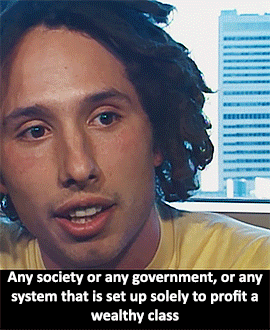
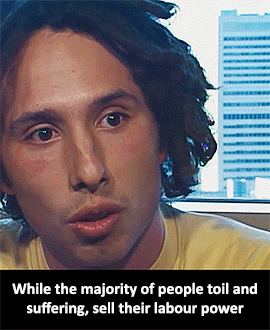
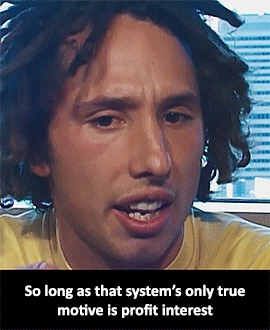
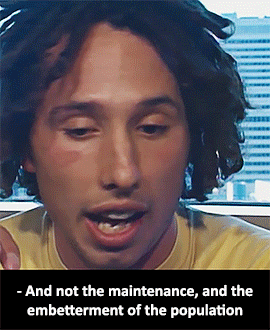

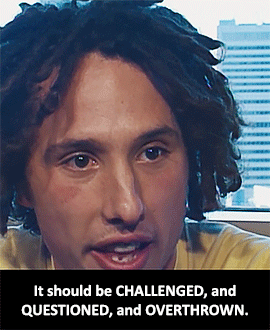
Zack de la Rocha of Rage Against the Machine, 1997 [x]
#Rage Against the Machine#Zack de la Rocha#ratm#ZDLR#anti capitalism#capitalism#anti establishment#authoritarian#anti authoritarian#anarchy#anarchism#socialism#revolution#oppression#politics#class struggle#class war#class warfare#rebel#rebellion#protest#1990s#90s#1997#my gifs
10K notes
·
View notes